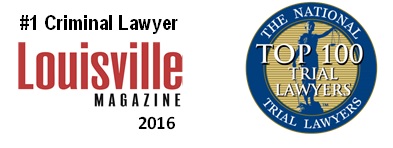RAISING FEDERAL ISSUES IN A STATE COURT PROSECUTION CAN TURN A
LOSER CASE INTO A NOT GUILTY VERDICT
All state courts must follow the U.S. Constitution. However, if your attorney fails to argue that your federal rights were violated by the local police, the Commonwealth Attorney or the Circuit Judge, you cannot raise that issue in federal court. It is absolutely essential that all potential federal issues are argued in pre-trial hearings, motions, motions in limine at trial, at sentencing and in state post-convictionproceedings. The lawyer for the accused must “fairly present” the federal law claims at every level of the state court. This includes the trial court, the appellate court and the Kentucky Supreme Court. The federal claim must be presented at the time when the state procedural law permits consideration of all federal claims. If your attorney fails to comply with the state procedural rules, you lose your federal claim. This means the federal court will not hear your case. Your case will never be considered by a federal appellate court, much less the U.S. Supreme Court. SeeBaldwin v. Reese, 541 U.S. 27 (2004), Bell v. Cone, 543 U.S. 447 (2005) and Gray v. Netherland, 518 U.S. 152 (1996). In order for the federal issue to be properly preserved for federal appellate consideration the objection or motion must fairly state the specific reason or reasons why the defendant (accused) believes the evidence should be excluded or admitted. You should always include a violation of the federal due process clause when claiming a denial of a state law matter. See Hicks v. Oklahoma, 447 U.S. 343 (1980). Here are some issues you should be aware of:
INDICTMENT VARIANCEThis is an error related to variance of the indictment and the actual evidence produced. If the government relies on evidence different from what was alleged in the indictment and/or provided in the discovery, your Fifth and Sixth Amendment rights to the U.S. Constitution are jeopardized. You have a right to be alerted to the basic facts of the Commonwealth’s case so your lawyer can prepare an effective defense. Any violation of your Fifth Amendment rights or Sixth Amendment rights will implicate the Due Process Clause of the Fourteenth Amendment.
Your Fifth Amendment rights are:
● Double jeopardy rights.
● Due process rights.
● Right to remain silent.
● Right to a grand jury indictment.
Your Sixth Amendment rights are:
- Right to speedy trial.
- Right to jury trial.
- Right to be informed of the nature and cause of the accusation.
- Right to question the witnesses against you.
- Right to subpoena witnesses in your favor.
- Right to a lawyer
You should always be alert if the Commonwealth amends the indictment so the charge (new amended indictment) will fit the evidence or testimony they plan to use to obtain a guilty verdict. Amending an indictment right before trial or in the midst of trial can modify the essential elements of the crime charged and will violate your right to prepare a defense.
CHANGE OF COUNSEL
- If you decide to retain a new lawyer before the trial you may have a right to a continuance. If the court denies you a continuance your substitute lawyer may not have enough time to prepare for trial and your right to effective assistance of counsel is jeopardized. See Carlson v. Jes, 526, F.3d. 1018 (2008). U.S. v. Rivera-Guerro, 426, F.3d. 1130, held that the defendant’s Sixth Amendment rights and due process rights were violated when the trial court denied his request to substitute counsel.
MONEY FOR EXPERTS/INVESTIGATION
The trial court cannot deny your request for funds for an expert or investigative assistance if you are indigent and the request is reasonably necessary to present a defense. The key here is the necessity of the expert evidence. If you have a private attorney both the Commonwealth and the court will claim if you can afford a lawyer you can afford to pay an investigator. The reality is that many experts are more expensive than the cost of a trial attorney. You must show that the expert you request money for will only provide you the basic tools necessary for an adequate defense. Ake v. Oklahoma, 470 U.S. 68 (1985). You must prove “necessity” to get expense funding.
EXCULPATORY EVIDENCE
The Commonwealth must disclose to the accused evidence that is favorable to the accused. If the Commonwealth is relying on a confidential informant (snitch) to convict you, the prosecution is under a duty to provide you with information about the snitch’s backgroundincluding all history or character which bears on his ability to tell the truth. An informant’s mental health records or medical records which show a history of illegal drug use or mental illness must be disclosed to your attorney. Pennsylvania v. Ritchie, 480 U.S. 39 (1987).
If the prosecution has proof that a person who looked like you committed a similar crime this information must be disclosed to your attorney. D’Ambrosio v. Bagley, 527 F.3d. 489 (2008).Information that a government witness provided a contradictory statement is evidence favorable to an accused and must be disclosed. Robinson v. Mills, 592 F.3d. 730 (2010).A prosecutor who failed to disclose prior written statements which contradicted testimony at trial violatedBradyrights. Jacobs v. Singletary, 952 F.2d. 1282 (1992). If the police or Commonwealth is paying a witness or agreeing to reduce criminal charges that information is exculpatory and must be disclosed to the defense. The prosecution cannot use false evidence to convict.
The prosecution has a duty to correct false testimony. If a witness is mistaken and testifies falsely about a plea deal the prosecution must correct it. The prosecution cannot rely on the defense attorney to fix it in cross-examination. The prosecution’s failure is a violation of due process. See Nepue v. Illinois, 360 U.S. 284 (1959), Hayes.
MORNING OF TRIAL DISCLOSURE/EVIDENCE
A defense lawyer cannot effectively represent an accused at trial if the prosecution dumps extra evidence on him the morning of trial late. The holding or late disclosure of evidence can make it difficult to effectively counter without the time necessary for preparation. Even the failure of the prosecution to reveal the identity of a rebuttal witness can be a due process violation because it denies the accused the time to investigate the credibility of the witness. This in turn makes it a Sixth Amendment right to counsel denial. See Mavrico v. Ducleworth, 840 F.2d. 454 (1988). The failure of the police to collect and present potential evidence that helps the accused can result in a due process violation. The state has an obligation to elicit the truth and to search for the truth. The state is trusted to provide the accused with a fair trial and to prevent fraud on the courts. The bad faith failure of the state to prosecute and investigate evidence which is favorable to the accused is a violation of the Due Process Clause. Arizona v. Youngblood, 488 U.S. 51 (1988) andMiller v. Vasquez, 808 F.2d. 1116.
JURY SELECTION ERRORS
The trial court’s restrictions on questioning in voir dire could violate your due process rights if the restriction results in a denial of your rights. See Mu’mon v. Virginia, 500 U.S. 415 (1991), regarding the trial court’s refusal to allow defendants to question jurors regarding news reports. See Turner v. Murray, 476 U.S. 28 (1980) in which a death sentence was reversed when the trial court denied the defendant his request to question jurors about racial prejudice in an inter-racial case. See Britz v. Thieret, 940 F.2d. 226.
THE RIGHT TO PRESENT A DEFENSE
The exclusion of evidence offered by the defense may violate your Fifth and Sixth Amendment rights to present a defense. The Sixth Amendment right to confront and cross examine witnesses and the Due Process Clause of the Fourteenth Amendment of the Constitution guarantees you “a meaningful opportunity to present a complete defense.” Holmes v. South Carolina, 547 U.S. 319 (2000), Crane v. Kentucky, 476 U.S. 683 (1983) andFerensil v. Birkett, 501 F.3d. 469 (2007). Some trial judges will try to “trim the defense” by threatening to allow the prosecution to admit otherwise inadmissible evidence if the defense offers proof which “opens the door.” See Cltia v. Cambra, 360 F.3d. 997 (2004) about “opening the door.” A trial court limitation on cross exam can amount to a violation of your Sixth Amendment rights. Appellate courts are very sensitive to racial bias of a witness. The trial court’s refusal to allow the defendant to cross examine a government witness about his swastika tattoos violated the defendant’s rights under the Sixth Amendment. When tattoos suggested the witness harbored racial animosity against the groups to which the defendant belonged








